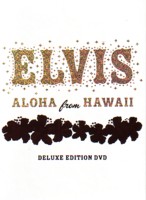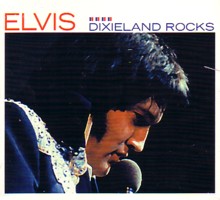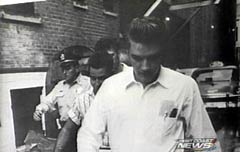 |
 |

de Leon, Charles Ponce. Fortunate son: the life of Elvis Presley: the ironic history of the King of Rock and Roll, Hill and Wang, New York, 2006. Pbk. 240 p. ISBN-10: 0-8090-3042-X; ISBN-13: 978-0-8090-3042-2.
de Leon is very thorough when providing the social, historical and economic setting for Presley in the early years and during his movie career. He also describes Presley's later physical and mental deterioration, his paranoia, and the contributing factors. If there is any omission, it is the historical and social background to Las Vegas and its possible impact on Presley, discussed at greater length below. The reason why de Leon omits this aspect is, of course, that it is not well covered in existing publications. The introduction starts with Elvis Presley rescuing a victim at a petrol station and the stunned reaction of all involved. This is an example of Presley's status as a living legend. De Leon looks at the myths surrounding Presley, exposing some as false. He considers how far Elvis was responsible for his own fate and how far his decline and early death were a result of his circumstances. Elvis was affected by the times he lived in to a degree which is not yet fully acknowledged or appreciated. The irony referred to in the subtitle is that the seeds of the current mythology grew from Presley's decline and fall - his worst years, not his best. de Leon discusses seminal events in Elvis's life: his childhood, his push to be discovered, his rise to fame, his induction into the army, his movie career in the 1960s, Elvis meets the Beatles, the Comeback Special, the Elvis-Nixon meeting, the divorce, the Aloha from Hawai'i concert, and Presley's mental and phsysical deterioration during the Las Vegas years. When Linda Thompson left Elvis in 1975, it was another turning point. Covering the early years, de Leon delves into the history of Tupelo from the time of the first settlers, the coming of the railway, cotton farming, tenants and sharecroppers, debt, impoverishment, racial tensions and segregation, and the effects of the Great Depression. Presley's parents, living in the poorest part of East Tupelo, were keen to emphasise respectability and avoid being called "white trash". Consequently, Vernon's jail term was a great humiliation for the family. The move to Memphis came at a post-war boom time. There Presley found a cultural melting pot of music. In the context of the 1950s, de Leon discusses the role of radio and television in spreading popular music locally and nationally. The intense backlash against Elvis's uninhibited performances is set against a background of conservative reaction to the burgeoning youth culture and sexual activity amongst teenagers. Northern attitudes towards the South were channelled through the Northeastern media elite, who saw rock and roll as a threat to the American way of life. The 1960s saw changing social, political and economic conditions, which Presley did not adapt to. Presley's later movies continued in a formulaic pattern at a time when the studio system in the movie industry was breaking down. Not only had the movie industry moved on, but popular music had become more sophisticated. From the time of the Beatles and Dylan, only singer-songwriters were considered true "artists". During his movie career, Presley became increasingly frustrated at his own lack of autonomy and the poor quality material he was given. Boredom and frustrustration were partly responsible for him turning to amphetamines. This should be understood as part of a wider misuse of prescription drugs by large numbers of the middle class in the post-war era.
In the 1970s and by the Aloha from Hawaii concert in 1973, Presley's audience was mainly white. Afro-Americans had become antagonistic towards Elvis and his music because of perceptions of music appropriation for personal gain. This was a misrepresentation of the facts, as de Leon explains. The Las Vegas years started off well. Presley was enthusiastic about performing there. But his mental and physical health deteriorated after his divorce. de Leon could have provided a historical setting for Las Vegas, a city built with mafia money and fairly much run by them during the 1960s and 1970s, and where glitz and glamour were the norm. The FBI did not act concertedly against organised crime in Las Vegas until the 1980s. It would be unlikely for any entertainer or manager in Las Vegas not to come up against the mob at one time or other. To me, at least, Col. Parker's massive gambling debts look supsiciously like an indicator of mafia control. But not much has been written on this topic - yet. The code of silence persists. While de Leon's book is fair and non-judgmental for the most part, he seems to disapprove of Presley's "garish outlandish" stage costumes and grandiose performing style as "sentimentality and ritualistic bombasity". Some of Presley's touches, de Leon tells us, drew on established Las Vegas conventions. Others were new and redefined the nature of a Vegas floor show. In all, de Leon recognises Presley's talent and significance as a true musical pioneer. He points out that Presley's voice developed and that he produced worthwhile songs during the 1960s. This came as a pleasant surprise, after reading the phrases "self-indulgent libertine" and "moral corruption" early on in the book. Summing up Presley in this way seemed to write him off as nothing more. The apparently derogatory phrases seem to run counter to the general tenor of the book, and could well be thrown in for reasons of academic respectability. It is a common problem for Elvis scholars, who feel the need to distance themselves from their subject to retain credibility in the eyes of other academics, the media and middle class readers. Generally, researchers are allowed to be enthusiastic over their research topics, unless the research topic is Elvis Presley. This is partly due to the stigma of the "pathological Elvis fan" and partly due to the fact that, on the whole, working class people are not considered suitable topics for biographies. In fact, the middle classes have generally viewed the phrase "working class hero" as a contradiction in terms. This is a widespread prejudice. Overall, Fortunate Son is neither unsympathetic nor a whitewash. It contains considered, in-depth and thought-provoking treatment of Presley's behaviour and actions and triggering factors. It is very readable as well as being thoroughly researched. A must-have! Susan MacDougall September 2006 Read Susan MacDougall's review of "Fairytale" EIN Note: Charles L. Ponce de Leon is also the author of the 2002 published book, "Self-Exposure Human Interest Journalism and the Emergence of Celebrity in America, 1890-1940" (The University of North Carolina Press, ISBN: 0807854034). The book is an excellent (and important) examination of how the cult of celebrity developed.
|
|





